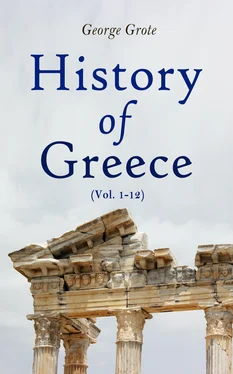George Grote - History of Greece (Vol. 1-12)
Здесь есть возможность читать онлайн «George Grote - History of Greece (Vol. 1-12)» — ознакомительный отрывок электронной книги совершенно бесплатно, а после прочтения отрывка купить полную версию. В некоторых случаях можно слушать аудио, скачать через торрент в формате fb2 и присутствует краткое содержание. Жанр: unrecognised, на английском языке. Описание произведения, (предисловие) а так же отзывы посетителей доступны на портале библиотеки ЛибКат.
- Название:History of Greece (Vol. 1-12)
- Автор:
- Жанр:
- Год:неизвестен
- ISBN:нет данных
- Рейтинг книги:5 / 5. Голосов: 1
-
Избранное:Добавить в избранное
- Отзывы:
-
Ваша оценка:
- 100
- 1
- 2
- 3
- 4
- 5
History of Greece (Vol. 1-12): краткое содержание, описание и аннотация
Предлагаем к чтению аннотацию, описание, краткое содержание или предисловие (зависит от того, что написал сам автор книги «History of Greece (Vol. 1-12)»). Если вы не нашли необходимую информацию о книге — напишите в комментариях, мы постараемся отыскать её.
History of Greece (Vol. 1-12) — читать онлайн ознакомительный отрывок
Ниже представлен текст книги, разбитый по страницам. Система сохранения места последней прочитанной страницы, позволяет с удобством читать онлайн бесплатно книгу «History of Greece (Vol. 1-12)», без необходимости каждый раз заново искать на чём Вы остановились. Поставьте закладку, и сможете в любой момент перейти на страницу, на которой закончили чтение.
Интервал:
Закладка:
But the miseries arising from woman, however great they might be, did not reach Promêtheus himself. For him, the rash champion who had ventured “to compete in sagacity” 171with Zeus, a different punishment was in store. Bound by heavy chains to a pillar, he remained fast imprisoned for several generations: every day did an eagle prey upon his liver, and every night did the liver grow afresh for the next day’s suffering. At length Zeus, eager to enhance the glory of his favorite son Hêraclês, permitted the latter to kill the eagle and rescue the captive. 172
Such is the Promêthean mythe as it stands in the Hesiodic poems; its earliest form, as far as we can trace. Upon it was founded the sublime tragedy of Æschylus, “The Enchained Promêtheus,” together with at least one more tragedy, now lost, by the same author. 173Æschylus has made several important alterations; describing the human race, not as having once enjoyed and subsequently lost a state of tranquillity and enjoyment, but as originally feeble and wretched. He suppresses both the first trick played off by Promêtheus upon Zeus respecting the partition of the victim—and the final formation and sending of Pandôra—which are the two most marked portions of the Hesiodic story; while on the other hand he brings out prominently and enlarges upon the theft of fire, 174which in Hesiod is but slightly touched. If he has thus relinquished the antique simplicity of the story, he has rendered more than ample compensation by imparting to it a grandeur of idéal , a large reach of thought combined with appeals to our earnest and admiring sympathy, and a pregnancy of suggestion in regard to the relations between the gods and man, which soar far above the Hesiodic level—and which render his tragedy the most impressive, though not the most artistically composed, of all Grecian dramatic productions. Promêtheus there appears not only as the heroic champion and sufferer in the cause and for the protection of the human race, but also as the gifted teacher of all the arts, helps, and ornaments of life, amongst which fire is only one: 175all this against the will and in defiance of the purpose of Zeus, who, on acquiring his empire, wished to destroy the human race and to beget some new breed. 176Moreover, new relations between Promêtheus and Zeus are superadded by Æschylus. At the commencement of the struggle between Zeus and the Titan gods, Promêtheus had vainly attempted to prevail upon the latter to conduct it with prudence; but when he found that they obstinately declined all wise counsel, and that their ruin was inevitable, he abandoned their cause and joined Zeus. To him and to his advice Zeus owed the victory: yet the monstrous ingratitude and tyranny of the latter is now manifested by nailing him to a rock, for no other crime than because he frustrated the purpose of extinguishing the human race, and furnished to them the means of living with tolerable comfort. 177The new ruler Zeus, insolent with his victory over the old gods, tramples down all right, and sets at naught sympathy and obligation, as well towards gods as towards man. Yet the prophetic Promêtheus, in the midst of intense suffering, is consoled by the foreknowledge that the time will come when Zeus must again send for him, release him, and invoke his aid, as the sole means of averting from himself dangers otherwise insurmountable. The security and means of continuance for mankind have now been placed beyond the reach of Zeus—whom Promêtheus proudly defies, glorying in his generous and successful championship, 178despite the terrible price which he is doomed to pay for it.
As the Æschylean Promêtheus, though retaining the old lineaments, has acquired a new coloring, soul and character, so he has also become identified with a special locality. In Hesiod, there is no indication of the place in which he is imprisoned; but Æschylus places it in Scythia, 179and the general belief of the Greeks supposed it to be on Mount Caucasus. So long and so firmly did this belief continue, that the Roman general Pompey, when in command of an army in Kolchis, made with his companion, the literary Greek Theophanês, a special march to view the spot in Caucasus where Promêtheus had been transfixed. 180
CHAPTER IV.
HEROIC LEGENDS.—GENEALOGY OF ARGOS.
Table of Contents
Having briefly enumerated the gods of Greece, with their chief attributes as described in legend, we come to those genealogies which connected them with historical men.
In the retrospective faith of a Greek, the ideas of worship and ancestry coalesced. Every association of men, large or small, in whom there existed a feeling of present union, traced back that union to some common initial progenitor; that progenitor being either the common god whom they worshipped, or some semi-divine person closely allied to him. What the feelings of the community require is, a continuous pedigree to connect them with this respected source of existence, beyond which they do not think of looking back. A series of names, placed in filiation or fraternity, together with a certain number of family or personal adventures ascribed to some of the individuals among them, constitute the ante-historical past through which the Greek looks back to his gods. The names of this genealogy are, to a great degree, gentile or local names familiar to the people,—rivers, mountains, springs, lakes, villages, demes, etc.,—embodied as persons, and introduced as acting or suffering. They are moreover called kings or chiefs, but the existence of a body of subjects surrounding them is tacitly implied rather than distinctly set forth; for their own personal exploits or family proceedings constitute for the most part the whole matter of narrative. And thus the genealogy was made to satisfy at once the appetite of the Greeks for romantic adventure, and their demand for an unbroken line of filiation between themselves and the gods. The eponymous personage, from whom the community derive their name, is sometimes the begotten son of the local god, sometimes an indigenous man sprung from the earth, which is indeed itself divinized.
It will be seen from the mere description of these genealogies that they included elements human and historical, as well as elements divine and extra-historical. And if we could determine the time at which any genealogy was first framed, we should be able to assure ourselves that the men then represented as present, together with their fathers and grandfathers, were real persons of flesh and blood. But this is a point which can seldom be ascertained; moreover, even if it could be ascertained, we must at once set it aside, if we wish to look at the genealogy in the point of view of the Greeks. For to them, not only all the members were alike real, but the gods and heroes at the commencement were in a certain sense the most real; at least, they were the most esteemed and indispensable of all. The value of the genealogy consisted, not in its length, but in its continuity; not (according to the feeling of modern aristocracy) in the power of setting out a prolonged series of human fathers and grandfathers, but in the sense of ancestral union with the primitive god. And the length of the series is traceable rather to humility, inasmuch as the same person who was gratified with the belief that he was descended from a god in the fifteenth generation, would have accounted it criminal insolence to affirm that a god was his father or grandfather. In presenting to the reader those genealogies which constitute the supposed primitive history of Hellas, I make no pretence to distinguish names real and historical from fictitious creations; partly because I have no evidence upon which to draw the line, and partly because by attempting it I should altogether depart from the genuine Grecian point of view.
Nor is it possible to do more than exhibit a certain selection of such as were most current and interesting; for the total number of them which found place in Grecian faith exceeds computation. As a general rule, every deme, every gens, every aggregate of men accustomed to combined action, religious or political, had its own. The small and unimportant demes into which Attica was divided had each its ancestral god and heroes, just as much as the great Athens herself. Even among the villages of Phokis, which Pausanias will hardly permit himself to call towns, deductions of legendary antiquity were not wanting. And it is important to bear in mind, when we are reading the legendary genealogies of Argos, or Sparta, or Thêbes, that these are merely samples amidst an extensive class, all perfectly analogous, and all exhibiting the religious and patriotic retrospect of some fraction of the Hellenic world. They are no more matter of historical tradition than any of the thousand other legendary genealogies which men delighted to recall to memory at the periodical festivals of their gens, their deme, or their village.
Читать дальшеИнтервал:
Закладка:
Похожие книги на «History of Greece (Vol. 1-12)»
Представляем Вашему вниманию похожие книги на «History of Greece (Vol. 1-12)» списком для выбора. Мы отобрали схожую по названию и смыслу литературу в надежде предоставить читателям больше вариантов отыскать новые, интересные, ещё непрочитанные произведения.
Обсуждение, отзывы о книге «History of Greece (Vol. 1-12)» и просто собственные мнения читателей. Оставьте ваши комментарии, напишите, что Вы думаете о произведении, его смысле или главных героях. Укажите что конкретно понравилось, а что нет, и почему Вы так считаете.












